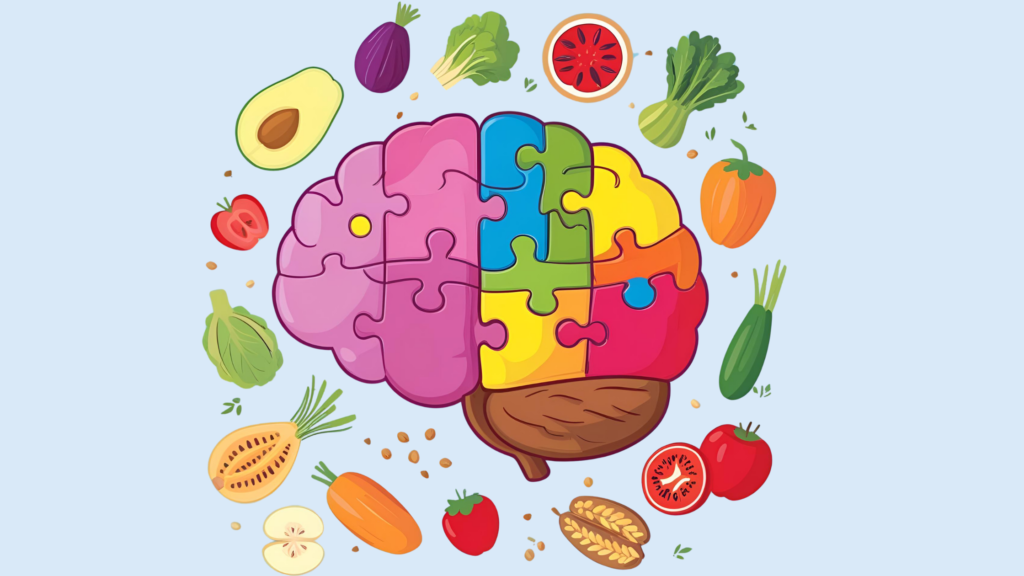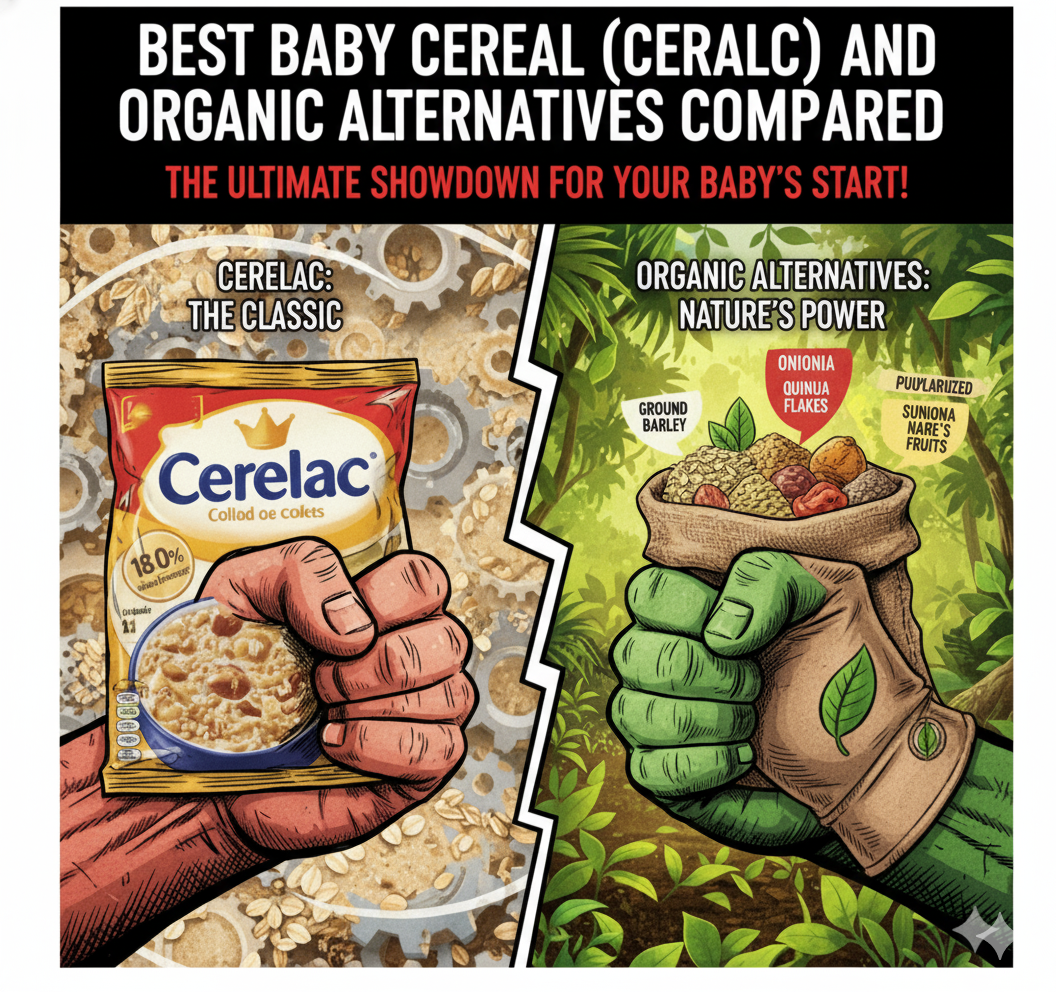
Brain development food for 4 year baby
Topic
Brain development food for 4 year baby
May start as early as
4 year
─────────
May end around
Never
Best Best Brain Development Foods for Your 4 Year Baby
Through this blog let us read about brain development food for 4 year baby. As your child goes through the stage of curiosity and exploration, their brain is growing at a rapid rate. At age 4, they’re hitting milestones that influence their cognitive skills, problem-solving, language, and even their emotional quotient. Perhaps one of the most significant things you can do to nurture this growth is to fuel it with the right nutrition.
In this blog we will cover-
- Importance of Brain Development at 4 Years
- Essential Nutrients for Brain Development
- Sources of right nutrients
- Why is 4 years an important milestone in nutrition?
Now first of all let us see

Uptodd Cereal Live Now !!
The importance of brain development at 4 years
From the age of 4, your child’s brain undergoes remarkable development and maturation. Connections between neurons are strengthening, various parts of the brain are starting to activate, especially those involved with cognition, emotion, and social interaction. The right nutrition can greatly assist in this growth, ensuring that the child has the necessary capabilities for his/her future.

For example, if we talk about the prefrontal cortex which assists in having higher order functions like reasoning, decision-making, and problem solving, while the hippocampus performs functions such as recalling information and learning. DHA (Omega-3 fatty acids) is important in the growth of the hippocampus as well as the prefrontal cortex. It enhances in memorizing items to be learned and performing mental activities. Iron is vital in the relaying of focus, attention, and recalling information. The right balance of iron allows children to be active as well as mentally alert.
Still, choline plays a crucial role in the formation of acetylcholine and a neurotransmitter that enables transmitting signals between neurons, aiding in speech and language comprehension.
Similarly, zinc helps with growth of nerves and synapses and enhances acetylcholine and memory language which are key factors for the understanding of the child’s ability to communicate.

Supporting brain development at this stage has a long-term effect on future learning, behavior, and emotional health in addition to influencing current milestones.
Essential Nutrients in Brain Development Food for 4 Year baby
There are few essential nutrients that are required for a healthy brain development-

| Nutrient | Brain Region Targeted | Why It’s Important |
| DHA (Omega-3) | Prefrontal Cortex, Hippocampus | Supports memory, focus, decision-making, and overall cognitive flexibility |
| Iron | Hippocampus, Prefrontal Cortex | Helps produce neurotransmitters and supports oxygen flow to the brain for sharp focus |
| Zinc | Temporal Lobes, Prefrontal Cortex | Supports learning, language skills, attention, and social development |
| Choline | Broca’s & Wernicke’s Areas, Hippocampus | Aids in memory and the formation of neural pathways for speech and comprehension |
| Magnesium | Amygdala, Prefrontal Cortex | Helps regulate emotions, calms the brain, and supports self-control |
| Protein (Amino Acids) | Cerebral Cortex, All neural regions | Builds and repairs brain cells; supports neurotransmitter activity |
| B Vitamins (B6, B12, Folate) | Entire Brain (esp. prefrontal and temporal lobes) | Supports energy metabolism in brain cells and emotional regulation |
| Antioxidants (Vitamin C, E) | Cerebral Cortex | Protect brain cells from oxidative stress and support overall brain health |
| Iodine | Developing brain as a whole | Crucial for making thyroid hormones, which influence brain development |
Reference- Effects of diet, Importance of DHA, Need of Iron for brain development
Now since we know the essential nutrients it is time for us to know the source of the same-
Sources for Brain Development Food for 4 Year baby
Fatty Fish (Salmon, Sardines)
Rich in DHA and EPA – essential for memory and focus.
Serve as: Fish cakes, grilled salmon sticks, or mashed into rice.
Eggs
Packed with choline, which supports memory and brain development.
Serve as: Boiled eggs, scrambled eggs, or egg-filled parathas.
Leafy Greens & Veggies (Spinach, Broccoli, Kale)
High in folate and antioxidants that protect brain cells.
Serve as: Green smoothies, veggie puris, or stuffed parathas.
Nuts & Seeds (Walnuts, Almonds, Flaxseeds, Chia Seeds)
Contain omega-3s, zinc, and vitamin E for brain health.
Serve as: Nut butters, energy balls, or sprinkled on porridge.
Berries (Blueberries, Strawberries)
Loaded with antioxidants that enhance memory and coordination.
Serve as: Smoothies, yogurt bowls, or fruit skewers.
Dairy (Milk, Yogurt, Cheese)
Provides vitamin D, protein, and B-vitamins needed for brain growth.
Serve as: Milkshakes, fruit yogurt, or cheese sandwiches.
Avocados
Full of healthy fats that support blood flow to the brain.
Serve as: Avocado toast or mashed in rotis/parathas.
Lean Meats & Lentils
Rich in iron – vital for focus, memory, and energy levels.
Serve as: Chicken curry, dal rice, or lentil soup.
Whole Grains (Oats, Brown Rice, Whole Wheat)
Provide glucose for steady brain energy and fiber for gut health.
Serve as: Oat porridge, brown rice khichdi, or multigrain chapatis
Why is Brain Development Food for 4 Year baby is important?
At 4 years of age they are not yet school-age children, nor are they toddlers. This time of transition is full of changes:
The Cognitive Leap
More intricate neural pathways begin to form in their brain. They start to reason, investigate abstract thought, and ask “why.” The prefrontal cortex (for planning and attention) and the hippocampus (for memory formation) are particularly involved in this fast brain activity.
The Start of Emotional Maturity
This is a result of their prefrontal cortex and amygdala learning to cooperate. B vitamins and magnesium are two nutrients that help control mood and lessen anxiety.
The growth of Language
Sentence structure becomes more intricate and vocabulary grows rapidly. Particularly happening in regions in Wernicke’s and Broca’s sections. Choline, protein, and zinc help with verbal fluency and comprehension.
Self-reliance and social skills
They’re learning rules, interacting with peers, growing in empathy, and becoming more social. Stronger neural connections in the prefrontal cortex and temporal lobes are responsible for these behaviors.
Better focus, memory, and emotional equilibrium—all necessary for this development—are supported by a balanced diet.
In other words, the age of four serves as a bridge between the early childhood brain wiring and the years of structured learning that lie ahead. Additionally, nutrition serves as the building crew, ensuring that each component of the brain receives the nourishment it needs to develop quickly, effectively, and intelligently.
A healthy meal plan for 4 year baby- Food for 4 year baby
| Day | Breakfast | Mid-Morning Snack | Lunch | Evening Snack | Dinner |
| Monday | Ragi porridge with banana slices + 1 boiled egg | Apple slices with nut butter | Rajma + ½ chapati + ½ bowl rice + carrot & cucumber salad | Homemade fruit yogurt | Mixed veg khichdi + curd |
| Tuesday | Vegetable poha + coconut water | Handful of soaked almonds + orange wedges | Chole + ½ chapati + beetroot salad + 1 spoon ghee | Sweet potato fries + buttermilk | Moong dal + rice + sautéed spinach |
| Wednesday | Oats porridge with chia seeds and mango chunks | 1 cheese cube + pear slices | Mixed vegetable paratha + curd + mint chutney | Roasted makhana + coconut chunks | Lauki kofta curry + ½ chapati + rice |
| Thursday | Besan chilla with tomato chutney | Boiled corn with lemon and salt | Palak dal + ½ chapati + rice + cucumber raita | Banana oat cookies + milk | Vegetable daliya + paneer cubes |
| Friday | Whole wheat toast + scrambled eggs + milk | Watermelon slices + cashews | Masoor dal + carrot beans sabzi + ½ chapati + rice | Stuffed dates + coconut water | Pumpkin soup + idli + peanut chutney |
| Saturday | Dosa + ghee + sambhar | Chikoo smoothie | Vegetable pulao + raita + papad | Whole wheat crackers + cheese spread | Tofu stir-fry + rice + moong soup |
| Sunday | Stuffed methi paratha + curd | Banana + 1 spoon flaxseed powder | Chicken curry (or soya for veg) + ½ chapati + rice + salad | Ragi laddoo + milk | Vegetable upma + coconut chutney |
Foods to Limit for Brain Health
- Sugary meals and beverages can lead to concentration issues and energy crashes.
- Fast food and fried foods are heavy in bad fats that affect learning and memory.

- Processed snacks and refined carbohydrates raise blood sugar levels and provide little nourishment for the brain.
- Artificial preservatives and additives are associated with decreased attention span and hyperactivity.
- Too much salt can cause dehydration, which impairs concentration and alertness.
- Trans fats can slow down brain processing and affect memory.
FAQ
1. What are the best brain foods for 3 year olds vs. 4 year olds?
While both ages need nutrient-rich foods like eggs, fish, and leafy greens, a 4-year-old can handle more variety in textures and meals. Learn more in our full brain food guide for 3-year-olds.
2. Is there a difference between baby and toddler brain nutrition?
Yes. Babies (0–12 months) need breast milk or formula alongside soft solids like pureed fruits and iron-fortified cereals. See our complete guide to brain development food for babies.
3. What foods support brain growth at 9 months?
At 9 months, foods like mashed avocado, banana, egg yolk, and lentils are ideal. Get age-specific tips in our post on brain food for 9-month-old babies.
4. What’s the best first brain food at 6 months old?
At 6 months, introduce pureed foods rich in iron, DHA, and choline. Explore more options in our brain food guide for 6-month-old babies.
5. What should a 1-year-old eat for brain development?
Offer whole milk, soft scrambled eggs, cooked fish, and fruits like blueberries. Check out our full guide to brain development food for 1-year-old babies.
Conclusion
Your child is going through an amazing stage of brain development and change at the age of four. They have a sharper memory, more expressive emotions, and an insatiable curiosity. In addition to promoting cognitive development, proper nutrition during this critical period establishes the groundwork for robust learning capacities, emotional stability, and general wellbeing.
You are nourishing more than just their stomach when you provide meals that are well-balanced, vibrant, and full of vital nutrients like DHA, iron, choline, and antioxidants. You are also fostering their potential. Keep in mind that you’re never alone on this journey thanks to UpTodd’s recipe and diet section






